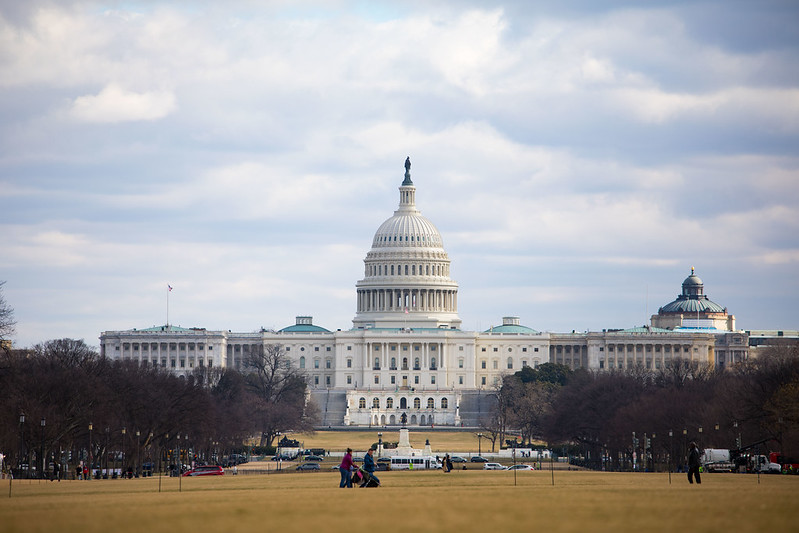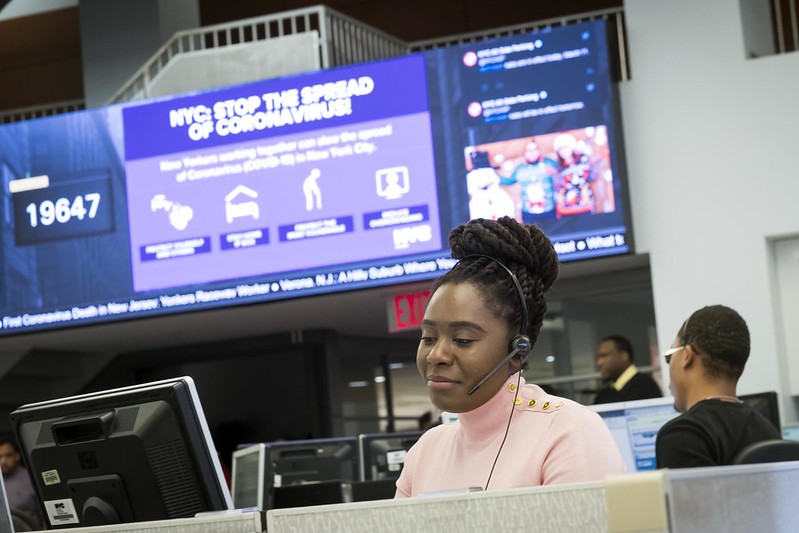Bail Reform Rollbacks are a Dangerous Failing of Moral Courage

State lawmakers wrongly bowed to law enforcement pressure on bail reform, the author writes (photo: governor's office)
Predictably, and disappointingly, the New York State Legislature rolled back last year’s historic and hard fought bail reforms at the eleventh hour. It was an act of cruelty after providing our communities the briefest of reprieves following the historic enactment of bail reform just three months ago, on January 1.
Less than two minutes of floor debate allowed racists and prison profiteers to win in their crusade to diminish the reforms, condemning thousands more black, brown, and poor New Yorkers to our broken system of mass incarceration. While the debate was over quickly, the consequences will be felt for generations.
The changes decrease public safety and increase New York’s role in mass incarceration. More misdemeanors are back on the books as eligible for money bail, as are several non-violent felonies like grand larceny in the first degree and criminal possession of a controlled substance in the first degree. In practice, the law blames poor people for the conditions our governments impose on them, allowing factors like lack of stable housing and employment to increase the likelihood of destabilization, arrest, and pretrial detention.
District Attorneys will almost certainly exploit the expansion of bail eligible cases, maximizing their ability to jail the poor pre-trial by upcharging and overcharging incidents as hate crimes or domestic violence. Worse, the rollbacks will result in at minimum hundreds, possibly thousands, more to be incarcerated — possibly preventing the supposedly imminent closure of the Rikers Island jails.
From the moment the clock struck midnight on January 1 and New York’s bail reforms went into effect, critics of the changes and defenders of the status quo went on the attack, determined to undo key measures of justice. They painted a false picture of chaos and anarchy throughout the state, perpetuating the assumption that not forcing legally innocent poor people to remain in jail would make our communities unsafe.
The myth that bail reform would lead to lawless anarchy was absurdly false, but effective at creating a bogeyman. The reality is the now-rolled back bail laws worked. For every cherry-picked, misrepresented case in the media, thousands of black, brown, and poor people were being released pending trial like their wealthy, white counterparts had been for so long. They returned to court, and rates of violent crime did not increase. Lives were saved. Families were spared the intergenerational violence and trauma of incarceration. Housing and jobs were kept. Communities are safer because people with mental health and substance use issues had opportunities for treatment, instead of suffering the cruel, dual punishments of inadequate healthcare while locked in a jail cell.
If the opposition’s aim was merely to create safe and healthy communities, they would be working alongside criminal justice reform advocates to expand public health interventions, affordable housing, education and community-based programs. Opponents of bail reform had a different aim than public safety. Their goal is to reclaim more control over the justice system that remains filled with black, brown and poor New Yorkers. This twisted investment in systemic racism and addiction to punishment comes at the cost of real human lives.
There are legislators who will look at this archaic return to yesteryear and try to tell you the rollbacks aren’t as bad as it could’ve been. That they saved us from “dangerousness” being added to the books, but we know better. One missing tool in a toolbox of oppressive measures isn’t enough to stop a system that is swallowing entire communities whole.
Do not be fooled. There are no heroes here. Any call that these changes are minor is an act of deceit. When taken from the state Capitol building and brought into our criminal courtrooms, the increase in incarceration will be anything but minor.
What is happening here in New York isn’t new. When slavery was abolished, racists adapted and we were met with the Black Codes and convict leasing. When that system as it existed “fell” we eventually received mandatory minimums, three strikes, stop-and-frisk, and broken windows policing. It is no different today. As we fight to dismantle our racist oppressive systems, our opponents are working tirelessly to build new supports to continue to prop them up.
In these recent state budget negotiations, New York’s elected officials had the choice to stand strong and defend bail reform. Instead they chose to retreat and uphold a system of mass punishment -- based on the lies of the very people who directly profit from incarceration and state violence against black, brown, and poor people.
Governor Cuomo and the New York State Legislature failed the test of moral courage.
***
Tiffany Cabán is a national organizer with the Working Families Party. On Twitter @tiffany_caban.
***
Have an op-ed idea or submission for Gotham Gazette? Email This email address is being protected from spambots. You need JavaScript enabled to view it.
The $2.1 Trillion Coronavirus Relief Bill - What’s In, What’s Not, What’s Next?

Federal aid to New York is coming, but how much (photo: Benjamin Kanter/Mayor's Office)
On Friday, the president signed into law The Coronavirus Aid, Relief, and Economic Security (CARES) Act. The $2.1 trillion CARES Act provides significant support for people, states, the health care system, small businesses, and yes, big businesses too.
The historic legislation is the third in a series of swift responses by Congress to ameliorate the immediate and unparalleled toll of the COVID-19 pandemic. According to early estimates, New York State is set to receive $15.1 billion in federal relief, including in human services, education, homeland security, housing, transit, independent agencies, and more.
We’ll dig deeper into the full range of relief for human services in the coming days, but below are some of the key provisions – some of which will temporarily make whole those whose jobs were sacrificed to protect the public’s health. However, there are serious concerns with respect to housing, cash assistance, nutrition, and state relief. Moreover, many programs will be arbitrarily cut off instead of automatically being tied to economic indicators that signal a recovery is truly underway.
Unemployment Insurance (UI)
There’s a lot to like in the UI provisions, including: $1 billion in emergency grants to states and 100 percent federal funding for extended benefits in states with an unemployment rate above 10 percent; a significant expansion of eligibility to include part-time workers, independent contractors, the self-employed, and so-called gig economy workers such as drivers for taxis, Uber, and Lyft; an additional $600 per week increase in UI benefits for up to 4 months; an additional 13 weeks of UI (beyond the number of weeks each state provides); and full funding for states with existing work-sharing programs, such as New York.
Cash Payments
Eligible adults will receive a one-time payment of $1,200 and eligible minors under the age of 17 will receive an additional $500. Amounts will be phased down above a threshold of $75,000 for individuals, $112,500 for head of households, and $150,000 for joint filers.
It is deeply unfortunate that Congress excluded millions of immigrants and their families across the country, many of whom pay taxes and are on the front lines caring for the ill and putting food on our tables. By excluding workers who pay federal income taxes with an Individual Taxpayer Identification Number (ITIN) from receiving stimulus payments, Congress has left out more than 5 million children – most of whom are U.S. citizens.
Additionally, vulnerable populations – such as those who receive the bulk of their income from untaxed sources such as Social Security, veterans benefits, or disability benefits, and those whose incomes are so low they don’t have to file a return – will have to file a tax return. The Treasury can and should use its discretion to prioritize getting checks out as quickly as possible and ensure Volunteer Income Tax Assistance (VITA) programs are sufficiently funded to reach those who do need to file a return.
Finally, these payments do not take into account geographical differences in the cost-of-living. In New York City, for example, the full $1,200 for a qualifying individual doesn't even cover one month of median rent.
State Fiscal Relief
New York State will receive $7.543 billion through the Coronavirus Relief Fund. The Fund – available until December 21 – helps states mitigate massive budget shortfalls due to widespread joblessness, plummeting tax revenue, and an increase in human needs.
However, New York’s share is just five percent of the $150 billion available for all states, even as New York is reporting nearly half of all confirmed COVID-19 cases in the U.S. Already, New York State is forecasting $10 to $15 billion less than previously expected in tax revenue as a result of COVID-19 measures, and Citizens Budget Commission predicts up to a $20 billion shortfall in New York City revenue over the next three fiscal years. In other words, state fiscal relief is likely to be significantly insufficient. (It’s worth noting that Senator Schumer requested a much larger sum of $750 billion and has said he’s working on another relief package.)
Nutrition
Congress approved $15.5 billion to support increased participation in the Supplemental Nutrition Assistance Program (SNAP), $450 million for food banks through The Emergency Food Assistance Program (TEFAP), and provided temporary flexibility for states to expand SNAP. However, Congress missed the opportunity to modestly increase maximum SNAP allotment by 15 percent and minimum SNAP benefit from $18 to $30 per week.
Food pantries are being devastated as joblessness among low-paid and vulnerable workers is skyrocketing (as many as 750,000 may have lost their jobs in March alone).
Increasing benefits for the SNAP program would ease pressure on food banks. Furthermore, every $1 in SNAP spending resulted in $1.74 of economic activity during the depths of the Great Recession.
Housing
The CARES Act provides $4 billion for Emergency Solutions Grants to help people escape from or avoid homelessness and $3 billion for public housing operating funds and rental assistance, boosts energy assistance programs, and places a 120-day moratorium on all evictions from federally-assisted housing.
However, housing funding still falls short of existing unmet needs, let alone anticipated increases in costs from the COVID-19 crisis. Congress should follow the House’s lead by meaningfully boosting investments in rental assistance, operating support, and homelessness prevention, and by including mechanisms that take into account the impossibility of catching up on suspended rent payments that will accrue during this crisis.
Next
As COVID-19 spreads, with peak infection possibly weeks away, we face the possibility of a long-lasting and deep downturn. It is therefore urgent that Congress address legislative gaps, such as a few we’ve summarized above, in addition to a growing list of needs in child care, education, front line worker safety, testing, treatment, and prevention, income supports, and more.
***
Derek Thomas is Senior Fiscal Policy Analyst and Gaurav Gupta-Casele is Fiscal Policy Analyst at FPWA. On Twitter @dlthomasNYC & @FPWA.
***
Have an op-ed idea or submission for Gotham Gazette? Email This email address is being protected from spambots. You need JavaScript enabled to view it.
The City is Committed to Protecting Your Privacy During the Coronavirus Crisis

Taking coronavirus calls at 311 (photo: Ed Reed/Mayoral Photography Office)
Your personal information is just that: personal. Even during a pandemic, it’s important that we make sure that New Yorkers’ privacy is protected to the maximum extent possible, both during the emergency and in anticipation of the aftermath once the pandemic resolves.
As New York City’s Chief Privacy Officer (CPO), I am dedicated to protecting New Yorkers’ privacy. I lead a team of dedicated lawyers who staff the Mayor’s Office of Information Privacy and work year-round to safeguard individuals’ personal information. We support the work of city agencies and offices by providing information and guidance on privacy policies and best practices, and we are hard at work continuing to provide that guidance during the coronavirus crisis.
Keeping the personal information of New Yorkers private remains a priority of my office, even while the city is mobilized in a battle to protect New Yorkers against the coronavirus. Privacy protections can help aid effective emergency response.
During the COVID-19 crisis, we can ill afford to have our neighbors, coworkers, and friends unable or unwilling to come forward to get urgently needed help due to very real fears. As a privacy lawyer and a former social worker, I am particularly aware of the fears of traditionally underserved populations about privacy and unwanted government intervention. In the past, too many New Yorkers have felt excluded from or afraid of getting help from city government agencies, including individuals with criminal records, substance users, undocumented immigrants, sex workers, or individuals living with HIV, among others.
As the city responds to this crisis, we want New Yorkers to trust that, because their city government is committed to safeguarding their personal information, they can seek and receive the care and services they need, both now and in the future.
In the course of government response to the coronavirus outbreak, there may be emergency situations that require sharing of certain information in order to best protect the public’s health and safety. For example, the city must share information with the state’s Health Department and the CDC in order to track and prevent the spread of disease. And one city agency may collaborate with other city agencies to share information with the public about available social services, food, and other resources. In these circumstances, it is important for New Yorkers to understand that our office remains in close contact with city agencies and officials to provide guidance and legal advice in order to ensure that privacy remains a priority and is protected to the greatest extent possible.
We are working hard every day to ensure New Yorkers’ information is kept appropriately protected when they interact with city government. In these efforts, city agencies have taken a careful approach and shown a strong desire to work with our office during citywide emergency response. We need this kind of focus on privacy to ensure that our most vulnerable residents will feel safe getting health care and food, and receiving essential services – both for their benefit and to protect the public’s health.
For our noncitizen residents, I want to emphasize that nothing about the coronavirus response changes our laws that protect your privacy in your interactions with city government. City agencies do not and will not share medical or social services information about coronavirus patients for immigration enforcement purposes. Immigrants should feel comfortable and confident seeking help in New York City. NYC Health + Hospitals treats all who need care, regardless of immigration status or ability to pay, and does not record immigration status.
My office remains as committed as ever to protecting New Yorkers’ privacy, to ensure everyone can get the services they need and deserve.
***
Laura Negrón has served as the General Counsel of the Mayor’s Office of Operations since 2015 and Chief Privacy Officer of the City of New York since 2018.
***
Have an op-ed idea or submission for Gotham Gazette? Email This email address is being protected from spambots. You need JavaScript enabled to view it.




